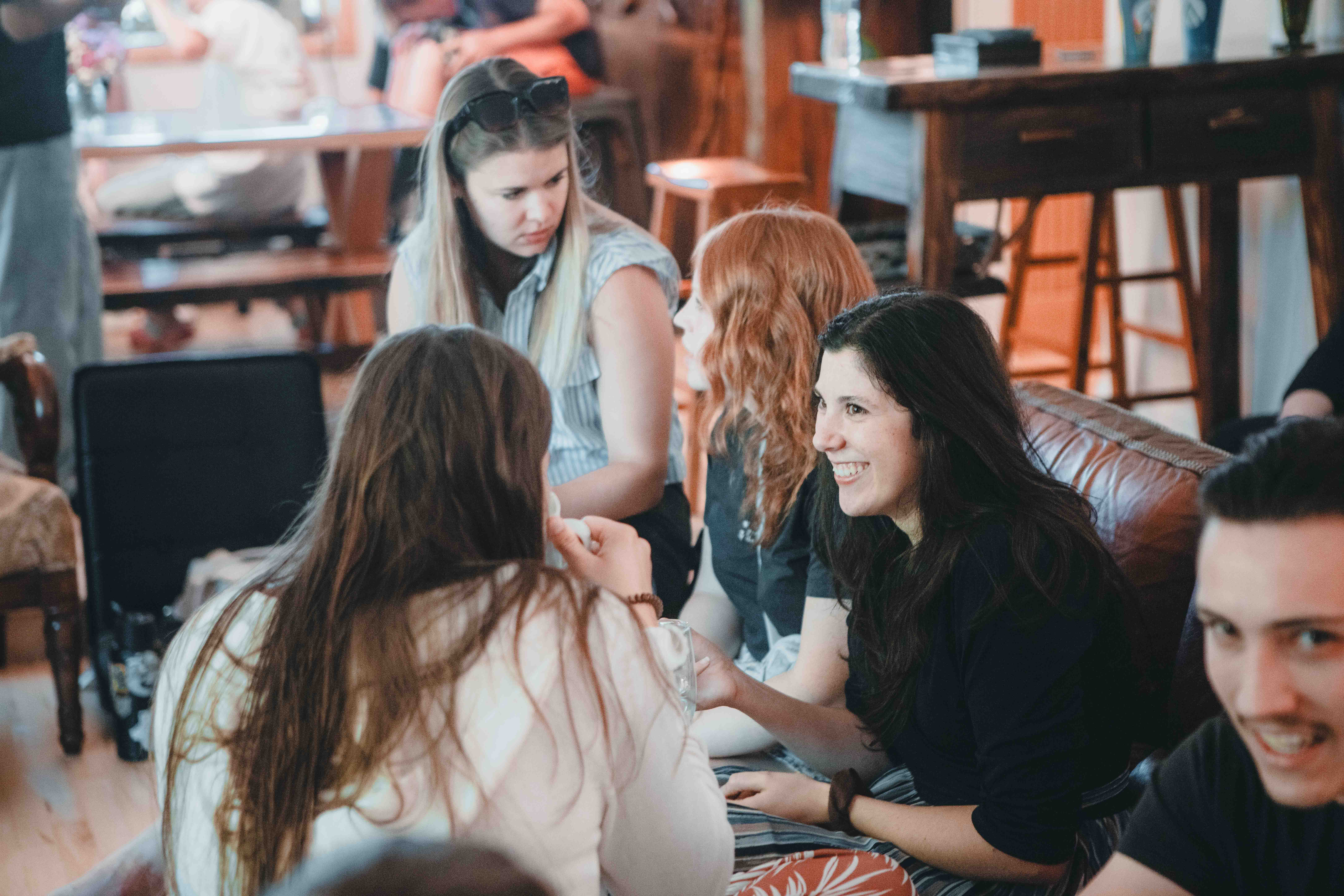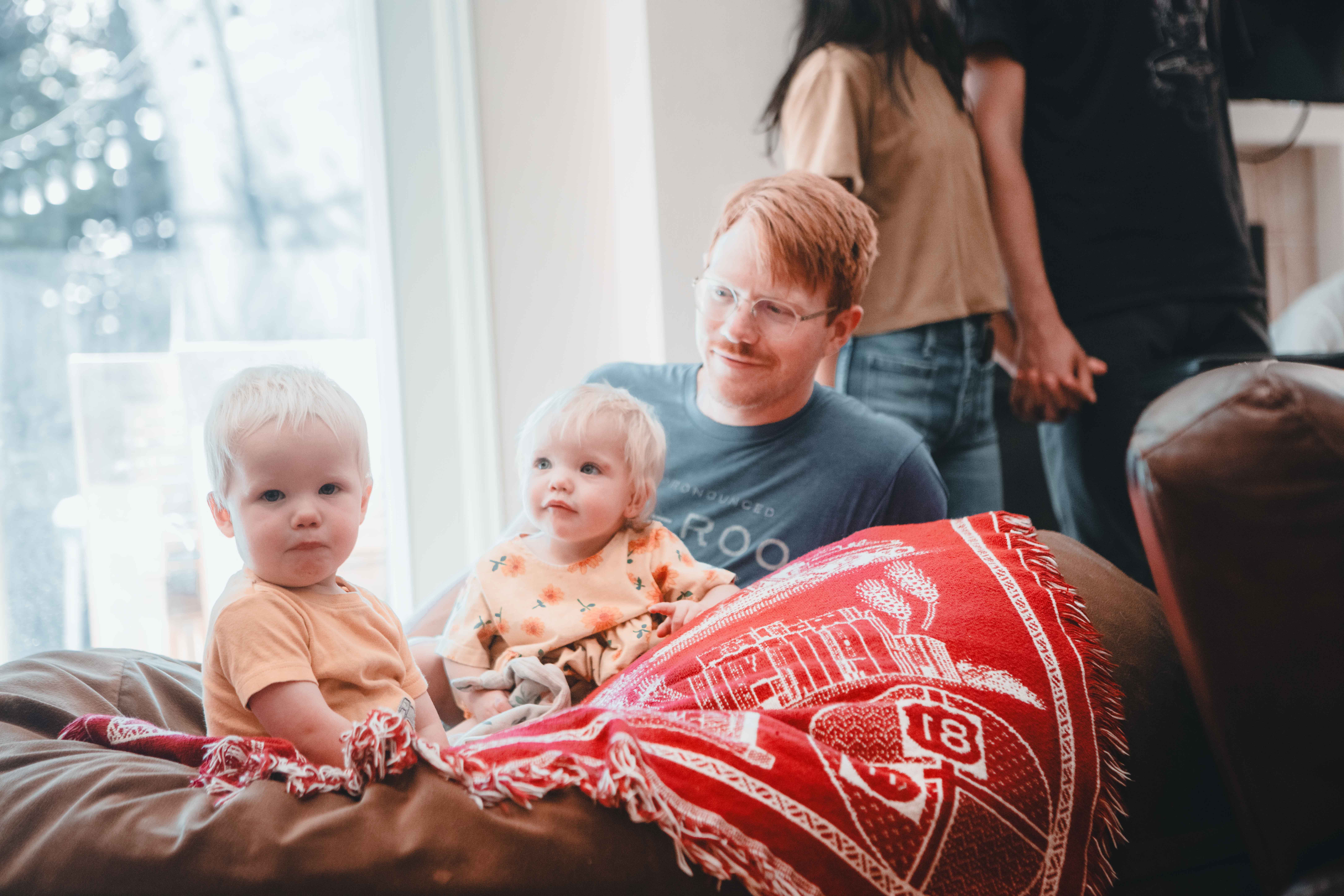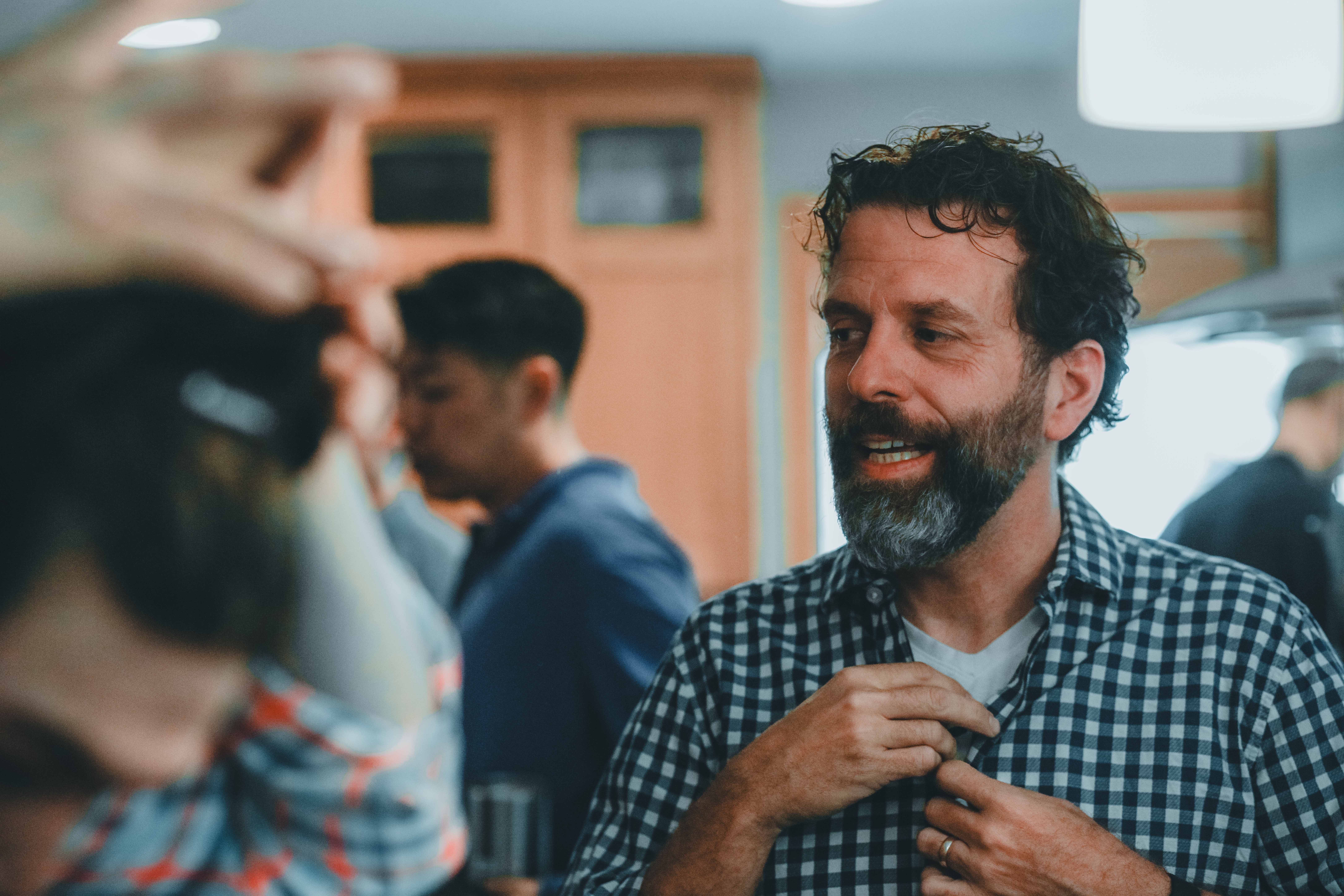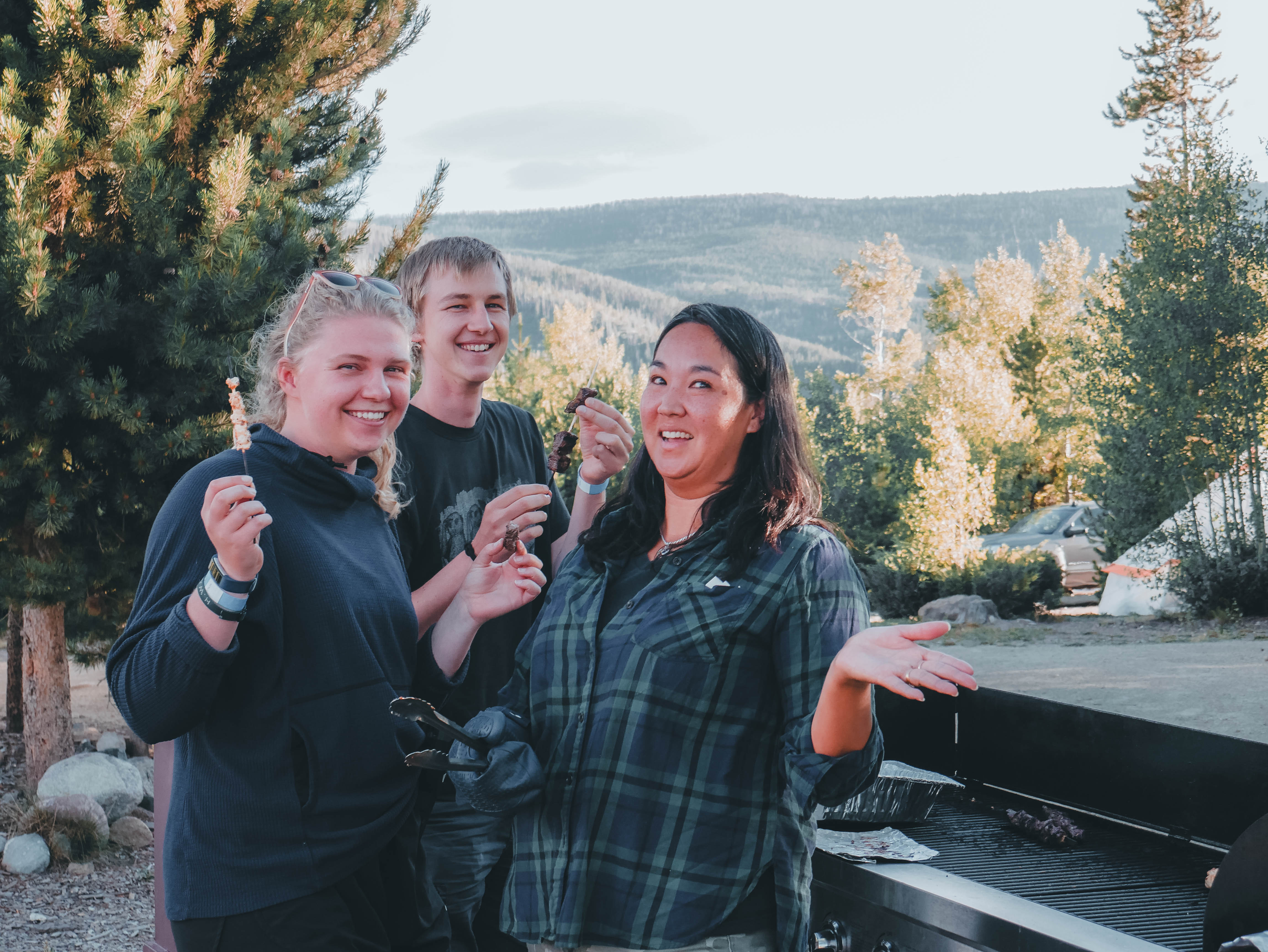Space to belong, believe, become, and belay.
This is our one-line, say-it-in-3-seconds, description and dream for belay.

Our Anchors
Our Vision includes Four Anchors: Belong, Believe, Become, and Belay. These Anchors serve as route markers along a Discipleship Pathway, guiding our ministry focus and influencing everything we do as a church.

Space to Belong.
We are a relational community that welcomes anyone and everyone to our table.
Relationships are hard. It can feel like the only way to gain acceptance is to fit into someone else’s mold.
God is different. He put his love for you before your belief in Him. In other words, you can belong before you believe.
And nothing—not your background, your likes or dislikes, your fears or hangups—can separate you from His love.
There's space to belong here.

Space to Believe.
We are a faith community that puts Jesus and His Word at the center of our lives.
A man once said to Jesus, “I do believe; help me overcome my unbelief!” (Mark 9:24).
That’s the struggle isn’t it? You want to believe, but you’re not sure what to do with your unbelief.
We get that. And we’re ok with questions.
At Belay, we see you and our door is always open to you. Bring your doubts and uncertainties, and work through them with others.
There's space to believe here.

Space to Become.
We are a growing community where godly transformations are encouraged and experienced.
“Follow me.”
That’s how Jesus begins a relationship; he invites you to follow Him.
And as you follow Him, you steadily move from unbelief to belief in every area of your life—changing what you love and how you live.
This process is often called discipleship. Sometimes painful and oftentimes exciting, discipleship is how we become more and more like Jesus.
At Belay, we’re all in that same process, so we'll be there when you fall, and give you a hand up when you lose your footing.
There's space to become here.

Space to Belay.
We are a missional community that creates space for others to belong, believe, become, and belay.
Believing in and becoming like Jesus is not easy. That's why we belay.
Just as the belayer catches a climber when they fall, our community catches each other when we fall.
We all need to both be on belay and belay others in our faith journey.
With God’s help, you can be someone’s belay.
There's space to belay here.
Our Values
12 Core Values underpin our ministry that—when embodied—create the space mentioned in our Vision, Mission, and Anchors.
Generous Hospitality
We express gratitude for God's generosity to us by being generous and hospitable to others.
The Bible tells the story of Zacchaeus, a man hated by most and loved by none—except Jesus. When no one else dared to show him kindness, Jesus did. In fact, Jesus even made himself a guest at Zacchaeus's house! When the crowds witnessed the newfound friendship between Zacchaeus and Jesus, they “began to mutter, ‘[Jesus] has gone to be the guest of a sinner”” (Luke 19:7).
Zacchaeus, however, had a different reaction to Jesus's kindness. In the hearing of all, Zacchaeus proclaimed, “Look, Lord! Here and now I give half of my possessions to the poor, and if I have cheated anybody out of anything, I will pay back four times the amount” (Luke 19:8).
At Belay, we endeavor to do the same. Grateful for God's generous hospitality to us, we are likewise generous and hospitable to others.
Grace and Truth
The Father kisses as he cleans and deals with sin in an embrace.
Jesus once told the story of The Prodigal Son. He was a young man who demanded his inheritance before his father had even passed—an insulting request in any culture. He then went off and squandered his father's wealth until he was completely destitute.
Eventually, the young man decided to return home. He said to himself, “I will set out and go back to my father and say to him, 'Father, I have sinned against heaven and against you. I am no longer worthy to be called your son; make me like one of your hired servants’” (Luke 15:18–20, NIV).
The boy did make the journey back home—but he never had the chance to finish his rehearsed confession. Why? Let's listen to Jesus finish the story: “His father saw him and was filled with compassion for him; he ran to his son, threw his arms around him and kissed him. The son said to him, ‘Father, I have sinned against heaven and against you. I am no longer worthy to be called your son...””
“But the father said to his servants, ‘Quick! Bring the best robe and put it on him. Put a ring on his finger and sandals on his feet. Bring the fattened calf and kill it. Let's have a feast and celebrate. For this son of mine was dead and is alive again; he was lost and is found.’ So they began to celebrate” (Luke 15:20–24, NIV).
We believe that Jesus—whom the Bible says is full of both grace and truth (John 1:17)—maintains both of these qualities as he deals with our sin. In other words, we have discovered that the Father kisses us as he cleans and deals with our sin in an embrace.
Therefore, having received such grace and truth from Jesus, we likewise endeavor to extend that same grace and truth to others.
The Big and The Small
We need the moments of a big group and the mix of a small group.
According to the book of Acts, the early church had a regular rhythm of meeting together in different venues, “Day after day, in the temple courts and from house to house, they never stopped teaching and proclaiming the good news that Jesus is the Messiah” (Acts 5:42, NIV).
Notice how they gathered in big groups (the temple courts) and in small groups (house to house). We think this variety of gatherings was deliberate.
From our experience, we find that big groups (typified by inspirational music and readily-applicable, Bible-based teaching) often give us the opportunity for life-transforming moments in God’s presence (where God instantly and positively transforms a life).
A small group, on the other hand (typified by conversation, laughter, prayer, and friendship) gives us a beautiful mix of steady growth in our relationship with God and one another.
These are the moments and the mix.
A big group moment in God's present where everything changes (brokenness is healed, faith is renewed), and a small group mix (relationships with God and one another continually deepen and flourish).
Childlike Faith
With God all things are possible.
Many have said that establishing a church in Boulder is impossible. “It’s too expensive.” “People aren’t interested.” “Plenty of good people have tried and failed.”
And while the intentions of those making the comments are good; we choose to move forward in childlike faith—believing that God desires to establish not only Belay, but also many other life-giving churches in Boulder (and beyond).
Jesus once said something that reframes everything: “with God all things are possible” (Matthew 19:26, NIV).
For us, “all things” includes Belay. It also includes the mountains of “impossibility” that we each face as we choose to live a missional lifestyle in our various spheres of influence.
Whatever hindrance we face as we endeavor to build His kingdom, we face it with childlike faith, remembering the words of Jesus, “With man this is impossible, but with God all things are possible” (Matthew 19:26, NIV).
Holy Spirit Dependence
Since we live by the Spirit, let us keep in step with the Spirit.
One day, Jesus surprised his disciples by saying, "it is to your advantage that I go away, for if I do not go away, the Helper will not come to you. But if I go, I will send him to you" (John 16:7, ESV)
Think of that! Jesus says it's to *our advantage* that he went away. How can this be?
Because after he ascended to the Father, he sent his Holy Spirit to help us with such things as *guiding us into "all the truth"* and *telling us "what is to come"* (John 16:13, NIV).
Furthermore, the Bible teaches that to each Jesus-follower, "the manifestation of the Spirit is given for the common good" (1 Corinthians 12:7 NIV). In other words, we each get a spiritual *gift* to help one another out. These gifts help us better understand what is on God's heart, and then share that with one another for our mutual encouragement and edification.
Just as important, the Bible also teaches that the Spirit helps every Jesus-follower develop Spiritual *fruit* such as: "love, joy, peace, forbearance, kindness, goodness, faithfulness, gentleness and self-control" (Galatians 5:22–23 NIV).
Essentially, once Jesus ascended, his followers became completely dependent on His Spirit.
Honestly, it's no different for us today. We still need the Holy Spirit to develop his fruit in our lives, give us the gifts he chooses, guide us in to how to live in a way that pleases God, and empower us to share his love with our neighbors.
This is why the Apostle Paul reflects on all this and simply says, "Since we live by the Spirit, let us keep in step with the Spirit" (Galatians 5:25, NIV).
Compassionate Evangelism
People don’t care what we know until they know that we care.
The Apostle Paul wrote to the believers in the ancient city of Thessalonica, saying, “Because we loved you so much, we were delighted to share with you not only the gospel of God but our lives as well” (1 Thessalonians 2:8, NIV).
Did you catch that? Paul didn't just share his words with the Thessalonians (important as they were), but he shared his life with them as well.
Furthermore, a little earlier in the same letter, Paul reminded the church that his preaching of the Good News was, “not simply with words but also with power, with the Holy Spirit and deep conviction” (1 Thessalonians 1:5 NIV).
This reveals that Paul's ministry—beyond the investment of his words and life—was further enhanced by the presence and power of the Holy Spirit.
At Belay, we're convinced that most people don't care what we know (even if it is Good News), until they know that we care. How will they know that we care?
They will know through compassionate evangelism. For us means: preaching the Good News with our words, demonstrating the Good News with our lives, and sharing the Good News with the power and presence of the Holy Spirit.
Eager Teachability
When we stop learning we stop growing.
The book of Proverbs contains a rather unexpected statement about teachability: “Whoever loves discipline loves knowledge, but whoever hates correction is stupid” (Proverbs 12:1, NIV).
Wait. Did the Bible just call us stupid? Maybe. If you're not willing to be taught, then yes . . . it did just say that. What's the solution?
Eager teachability. As followers of Jesus, we want more and more of our heart and lives exposed to the light truth of Jesus Christ.
Listen to what Paul says to the Ephesian believers: “For you were once darkness, but now you are light in the Lord. Live as children of light . . . and find out what pleases the Lord. . . . everything exposed by the light becomes visible—and everything that is illuminated becomes a light. This is why it is said: ‘Wake up, sleeper, rise from the dead, and Christ will shine on you.’ Be very careful, then, how you live—not as unwise but as wise, making the most of every opportunity. . . .Therefore do not be foolish, but understand what the Lord’s will is. Do not get drunk on wine, which leads to debauchery. Instead, be filled with the Spirit. . .” (Ephesians 5:8–18, NIV).
Following Jesus means moving from unbelief to belief in every area of our lives — continually learning what it means to follow and trust Jesus.
“By wisdom a house is built,” the book of Proverbs says, “and through understanding it is established; through knowledge its rooms are filled with rare and beautiful treasures” (Proverbs 24:3–4, NIV).
Keep learning and growing. Possess eager teachability.
God First
God gets the first and best of our time, talent, and treasure.
In the opening pages of the Bible, we're told a story of the world's first pair of brothers—and the offerings they both brought to the Lord.
“In the course of time,” Genesis tells us, “Cain brought some of the fruits of the soil as an offering to the LORD. And Abel also brought an offering—fat portions from some of the firstborn of his flock. The LORD looked with favor on Abel and his offering, but on Cain and his offering he did not look with favor” (Genesis 4:3–5, NIV).
A question comes to mind as we read this passage: why did God not look with favor on Cain's offering? Was it because he brought a plant offering instead of an animal offering like Abel?
Not at all. When Moses later introduced us to the Law, both plant and animal offerings were gratefully accepted.
The difference between the two offerings was the timing. Cain brought his “in the course of time,” while Abel brought the “firstborn of his flock.” In other words, Cain gave when it was convenient for himself. Abel, however, gave to God first.
The Bible says, “Bring the best of the firstfruits of your soil to the house of the Lord your God” (Exodus 23:19, NIV).
Notice the words “best” and “firstfruits” in that verse. Take a moment to also imagine all the work and skill it represents: cultivating the soil by hand, planting the seed, harvesting by hand, then bringing the first and best results to God.
For us at Belay, we take this to mean that God always gets the first and best of our time, talent, and treasure.
Walking in Freedom
We stand fast in the liberty by which Christ has made us free.
In the New Testament book of Galatians, the apostle Paul expresses concern about the followers of Jesus in ancient Galatia. He lovingly commands them to, “Stand fast therefore in the liberty by which Christ has made us free, and do not be entangled again with a yoke of bondage” (Galatians 5:1, NKJV).
While the Galatians had started off well, they began to be pulled off-course (and into the ditch) by the idea that they had to earn their salvation by works rather than receiving it freely in faith.
“You foolish Galatians!” Paul writes, “Who has bewitched you? Before your very eyes Jesus Christ was clearly portrayed as crucified. . . . Did you receive the Spirit by the works of the law, or by believing what you heard? . . . After beginning by means of the Spirit, are you now trying to finish by means of the flesh?” (Galatians 3:1–3, NIV).
At the same time, Paul didn't want the Galatians to be pulled off-course (to the ditch on the other side of the road) and believe they could simply live however they they wanted!
“You, my brothers and sisters, were called to be free,” Paul writes, “But do not use your freedom to indulge the flesh; rather, serve one another humbly in love” (Galatians 5:13, NIV).
Paul envisioned the Galatian believers walking in complete freedom and liberty. Free from the legalism of the law, and free from the lawlessness of reckless living. Free from guilt and condemnation, and free from regret and remorse. Freely living the life God intended.
At Belay, we endeavor to stand fast in the liberty by which Christ has made us free.
Contribution over Consumption
We are contributors, not consumers, using whatever gift we have received to serve others.
Church was never intended to be a show — a place where a few people perform, while everyone else passively observes.
Church was always meant to be a community — a place where space is made for everyone to belong, believe, become, and belay.
Peter (the most outspoken disciple of Jesus) wrote to the early Christians: “Each of you should use whatever gift you have received to serve others, as faithful stewards of God’s grace in its various forms. If anyone speaks, they should do so as one who speaks the very words of God. If anyone serves, they should do so with the strength God provides, so that in all things God may be praised through Jesus Christ.” (1 Peter 4:10–11, NIV).
The Apostle Paul wrote a similar (but more strongly worded) sentiment. “We gave you this rule,” he stated in his letter to the believers in Thessalonica, “The one who is unwilling to work shall not eat” (2 Thessalonians 3:10, NIV). Wow — that's pretty harsh!
Perhaps in an attempt to soften his tone, Paul concluded his thoughts by reminding us to simply, “never tire of doing what is good” (2 Thessalonians 3:13, NIV).
At Belay, we take all this to mean that contribution is better than consumption. With God's help, we will use whatever gift God has given us to lovingly serve the needs of one another.
Empowered Leadership
Leadership does not exist to perform a task—but do reproduce, multiply, and empower other leaders.
The Bible says in Ephesians 4:11–12 (NIV), “So Christ himself gave the apostles, the prophets, the evangelists, the pastors and teachers, to equip his people for works of service, so that the body of Christ may be built up.”
A similar sentiment is found in 2 Timothy 2:2 (NIV) where Paul writes, “And the things you have heard me say in the presence of many witnesses entrust to reliable people who will also be qualified to teach others.”
The message is clear. The purpose of church leadership is not to perform a task. The purpose of leadership is to reproduce and multiply by equipping and training the church, empowering each of us to do the works of the ministry.
“For we are God’s handiwork,” the Bible reminds us, “created in Christ Jesus to do good works, which God prepared in advance for us to do” (Ephesians 2:20, NIV).
At Belay, we envision a church that is filled with empowered people, cheerfully serving and empowering others. A church that values reproduction over production, and multiplication over addition. Why?
Because we're convinced that Biblical leadership does not exist to perform a task—but do reproduce, multiply, and empower other leaders.
Effective Structures
Only the message is sacred, not our methods, so we consistently adapt to make Belay better.
“What you are doing is not good.”
How would you like to hear those words? It's not pleasant to hear, but that's exactly what Moses's Father-in-Law (Jethro) said to him after observing how Moses had structured his “church.”
“What you are doing is not good,” Jethro said, “You and these people who come to you will only wear yourselves out” (Exodus 18:17-18, NIV).
The thing is: what Moses had been doing was good . . . until it wasn't. There came a time where things had to change in order for the community to continue thriving.
“No one pours new wine into old wineskins,” Jesus once said. “Otherwise, the wine will burst the skins, and both the wine and the wineskins will be ruined. No, they pour new wine into new wineskins” (Mark 2:22, NIV).
Our message is sacred and will never change: “For God so loved the world that he gave his one and only Son, that whoever believes in him shall not perish but have eternal life” (John 3:16, NIV).
Our methods (our structure and way of doing things) however, must change. From time to time, we must make adaptations in order to effectively reach and love our culture.
For this reason, we will always work to make Belay better. We will continually seek for God's direction in the current season, graciously give and receive feedback from one another, and adapt ourselves (without compromising our message) to the needs of our culture.
“To the weak I became weak, to win the weak. I have become all things to all people so that by all possible means I might save some” (1 Corinthians 9:22 NIV).
Our Beliefs
In essentials, unity.
The Christian faith has certain “essential” beliefs—informed by the Bible—wherein believers are called to stand in unity. Below, we share our beliefs on ten essential topics.
In non-essentials, liberty.
There are also some “non-essential” beliefs where sincere believers have different views. Here believers are called to extend liberty—acknowledging that everyone has their own convictions.
In everything, love.
Whether we agree on a specific issue or not, Christians are called to love—extending honor, respect and understanding to all.
Belay fellowships with the Assemblies of God, the world’s largest pentecostal denomination. The belief statements on our site are based on those of the AG.
Ten Essential Topics
God
God exists. He is the creator and sustainer of all things, and has lovingly revealed himself as Father, Son, and Holy Spirit (the Trinity).
The Bible
God speaks. The Bible—the Old and New Testament—is His infallible Word to us, authoritatively teaching us what to believe and how to live.
People
We are created in God’s image. While this gives us an incredible capacity for good, we’re also marred by a persistent inclination of disobedience toward God. This disobedience—or “sin” as the Bible calls it—separates us from God.
Holy Spirit
The Holy Spirit inhabits every follower of Jesus. He teaches, comforts, guides, convicts of sin, gives spiritual gifts (healing, miracles, prophecy, faith, tongues, etc.), and provides empowerment—the promise of the Father for every believer—to live a life set apart for God and his service.
Church
The Church is the body of Christ. It is composed of everyone—throughout history—who have ever trusted in Jesus. A church is also a local fellowship of believers (such as Belay)—committed to one another and the mission of Jesus—who gather regularly for worship and instruction with recognized leadership, practice the ordinances (baptism and communion), and function as a team and family.
Communion
Communion memorializes Jesus’ suffering on the cross. The bread and cup serve as symbols of His body and blood—giving us an opportunity to remember his sacrifice, examine our hearts, and experience His forgiveness anew.
Future Things
We were created to exist forever—and the nature of that existence hinges on our response to Jesus. Those who reject Him will experience God’s wrath, while those who trust Him will spend eternity with Him in the new heavens and earth.
Team Belay
We’re working together to create an environment of guidance, support, encouragement and resources to help each of us (including you!) to belong, believe, become, and belay.

Our mission is to create space to belong, believe, become, and belay.
On Belay
We put out a quarterly newsletter that shows up right here on our site.




